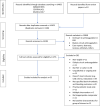A systematic review of the efficacy and safety of anticoagulants in advanced chronic kidney disease
- PMID: 36006608
- PMCID: PMC9584987
- DOI: 10.1007/s40620-022-01413-x
A systematic review of the efficacy and safety of anticoagulants in advanced chronic kidney disease
Abstract
Background: Patients with chronic kidney disease (CKD) have an increased risk of venous thromboembolism (VTE) and atrial fibrillation (AF). Anticoagulants have not been studied in randomised controlled trials with CrCl < 30 ml/min. The objective of this review was to identify the impact of different anticoagulant strategies in patients with advanced CKD including dialysis.
Methods: We conducted a systematic review of randomized controlled trials and cohort studies, searching electronic databases from 1946 to 2022. Studies that evaluated both thrombotic and bleeding outcomes with anticoagulant use in CrCl < 50 ml/min were included.
Results: Our initial search yielded 14,503 papers with 53 suitable for inclusion. RCTs comparing direct oral anticoagulants (DOACs) versus warfarin for patients with VTE and CrCl 30-50 ml/min found no difference in recurrent VTE events (RR 0.68(95% CI 0.42-1.11)) with reduced bleeding (RR 0.65 (95% CI 0.45-0.94)). Observational data in haemodialysis suggest lower risk of recurrent VTE and major bleeding with apixaban versus warfarin. Very few studies examining outcomes were available for therapeutic and prophylactic dose low molecular weight heparin for CrCl < 30 ml/min. Findings for patients with AF on dialysis were that warfarin or DOACs had a similar or higher risk of stroke compared to no anticoagulation. For patients with AF and CrCl < 30 ml/min not on dialysis, anticoagulation should be considered on an individual basis, with limited studies suggesting DOACs may have a preferable safety profile.
Conclusion: Further studies are still required, some ongoing, in patients with advanced CKD (CrCl < 30 ml/min) to identify the safest and most effective treatment options for VTE and AF.
Keywords: Anticoagulation; Atrial fibrillation; CKD; Stroke; Thrombosis.
© 2022. The Author(s).
Conflict of interest statement
Results presented in this paper have not been published previously in whole or part, except in abstract form. Within the last 3 years KP has received honoraria from Bayer. JT has received honoraria from Bayer, Boehringer Ingelheim, BMS-Pfizer, Daichi-Sankyo, Octapharma, Leo Pharma. JH, AS, RM, AP, SC, PL have no competing interests to declare that are relevant to the content of this article.
Figures







References
-
- Go AS, Hylek EM, Phillips KA, Chang Y, Henault LE, Selby JV, et al. Prevalence of diagnosed atrial fibrillation in adults: national implications for rhythm management and stroke prevention: the AnTicoagulation and Risk Factors in Atrial Fibrillation (ATRIA) Study. JAMA. 2001;285(18):2370–2375. doi: 10.1001/jama.285.18.2370. - DOI - PubMed
-
- Mitsuma W, Matsubara T, Hatada K, Imai S, Saito N, Shimada H, et al. Clinical characteristics of hemodialysis patients with atrial fibrillation: the RAKUEN (Registry of atrial fibrillation in chronic kidney disease under hemodialysis from Niigata) study. J Cardiol. 2016;68(2):148–155. doi: 10.1016/j.jjcc.2015.08.023. - DOI - PubMed
Publication types
MeSH terms
Substances
Grants and funding
LinkOut - more resources
Full Text Sources
Medical

